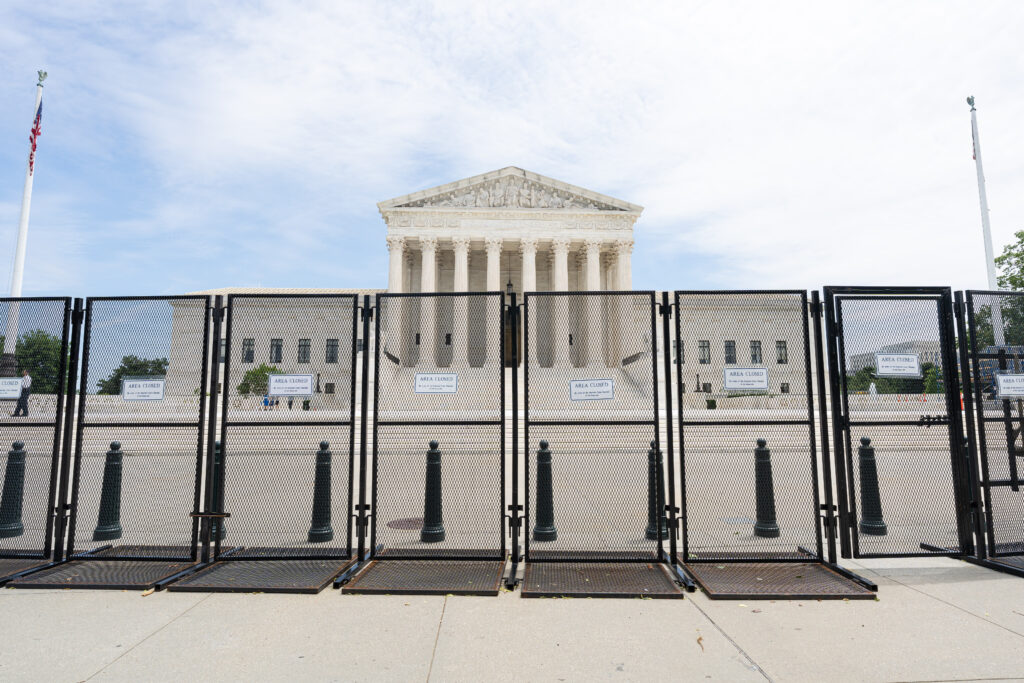On June 24, 2022, in the decision in Dobbs v. Jackson Women’s Health Organization, the Supreme Court of the United States (SCOTUS) overturned the long-standing precedent set by Roe v. Wade. The decision means states are no longer restricted from banning access to abortion in the first trimester of pregnancy, going against American public opinion and prompting further study of Americans’ views of the Court. In 2021, PRRI found that a slim majority of Americans (53%) trusted the Supreme Court to do the right thing only some or none of the time.
With six of the nine justices on the Supreme Court appointed by Republican presidents, it comes as no surprise that in 2021 Democrats were the most likely to report distrust in SCOTUS (56%), compared with 51% of independents and 46% of Republicans. Among all the demographics examined in the survey, including political affiliation, race, religious tradition, and age, Democrats were also the only demographic category that distrusted the Supreme Court (56%) more than the federal government (53%).
In the United States, Black women are far more likely than white women to die in relation to a pregnancy, and Black Americans are also the most likely to distrust the Supreme Court (68%), compared with 63% of multiracial Americans and about half of white Americans (51%), Hispanic Americans (49%), and Americans who identify with another race (48%).
Another SCOTUS ruling in 2022 safeguarded prayer in schools, a move that supported religious practices — and particularly evangelical Christian practices — in public spaces. Prior to this ruling, which might shift opinions among some religious groups, nearly half of white evangelical Protestants (49%) reported distrust in the Supreme Court, compared with nearly two-thirds of religiously unaffiliated Americans (65%) and Black Protestants (62%). Hispanic Catholics were the least likely to distrust the Court, with only four in ten expressing distrust (40%).
Negative View of Court Is Not New Among Democrats and Religiously Unaffiliated
In 2019, PRRI asked if Americans had a favorable or unfavorable impression of the Supreme Court. About half of all Americans (52%) had a very favorable or mostly favorable view of SCOTUS, and 28% had a mostly unfavorable or very unfavorable view. washington
Democrats were the least likely to say they had a favorable view of SCOTUS (34%), compared with three-fourths of Republicans (75%) and 55% of independents. More than seven in ten white evangelical Protestants (72%) had a favorable view of the Court in 2019, followed by white Catholics (63%) and white mainline Protestants (63%). Only 36% of religiously unaffiliated Americans held a favorable view.
Democrats Were Already on Alert in 2020
In 2020, 43% of Americans said the appointment of Supreme Court justices was a critical issue to them, four in ten said it was one among many important issues (40%), and 15% said it was not that important. A slim majority of Democrats (53%) considered the appointment of justices a critical issue, compared with 44% of Republicans and 34% of independents.
Black Americans were least likely to consider appointment of justices a critical issue (36%), and 23% did not consider appointments an important issue. Nearly half of Hispanic Americans (48%) and white Americans (45%) considered the appointment of justices a critical issue.
About four in ten white evangelical Protestants (41%) and white mainline Protestants (39%) considered appointments a critical issue. White Catholics were the most likely to consider appointments a critical issue (54%), and Black Protestants were the least likely (36%). Just under half of religiously unaffiliated Americans (45%) considered appointments a critical issue.
Democrats Support Court Expansion, Conservative Groups Oppose It
In 2020, a slim majority of Americans (52%) opposed or strongly opposed increasing the size of the Supreme Court from nine to 13 justices, compared with 45% of Americans who favored or strongly favored enlarging the Court. Nearly six in ten Democrats (59%) favored increasing the size of the Court, compared with 45% of independents. Less than three in ten Republicans (28%) favored increasing the size of the Court, and 70% opposed it.
Black Americans were the most likely to support expanding the size of the Court (61%), followed by Hispanic Americans (51%), and white Americans (41%).
White evangelical Protestants were the least likely to favor expanding the Court (32%), compared with six in ten Black Protestants (60%), 53% of religiously unaffiliated Americans, four in ten white mainline Protestants (40%), and 38% of white Catholics.
